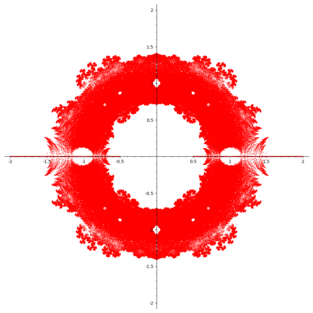Littlewood polynomial
In mathematics, a Littlewood polynomial is a polynomial all of whose coefficients are +1 or −1. Littlewood's problem asks how large the values of such a polynomial must be on the unit circle in the complex plane. The answer to this would yield information about the autocorrelation of binary sequences. They are named for J. E. Littlewood who studied them in the 1950s.

Definition
A polynomial
is a Littlewood polynomial if all the . Littlewood's problem asks for constants c1 and c2 such that there are infinitely many Littlewood polynomials pn , of increasing degree n satisfying
for all on the unit circle. The Rudin–Shapiro polynomials provide a sequence satisfying the upper bound with . In 2019, an infinite family of Littlewood polynomials satisfying both the upper and lower bound was constructed by Paul Balister, Béla Bollobás, Robert Morris, Julian Sahasrabudhe, and Marius Tiba.
References
- Peter Borwein (2002). Computational Excursions in Analysis and Number Theory. CMS Books in Mathematics. Springer-Verlag. pp. 2–5, 121–132. ISBN 0-387-95444-9.
- J.E. Littlewood (1968). Some problems in real and complex analysis. D.C. Heath.
- Balister, Paul; Bollobás, Béla; Morris, Robert; Sahasrabudhe, Julian; Tiba, Marius (2019). "Flat Littlewood Polynomials Exist". arXiv:1907.09464. Cite journal requires
|journal=(help)